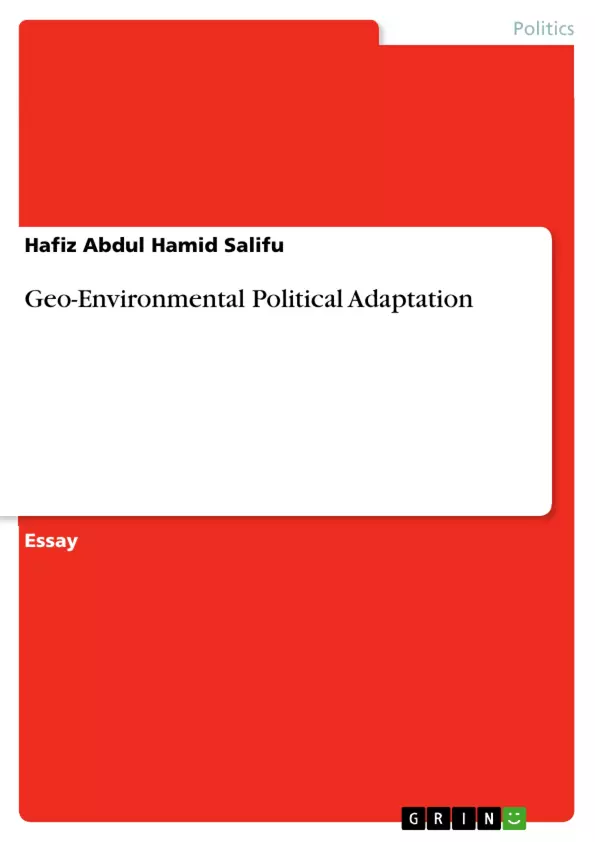This paper introduces Geo-Environmental Political Adaptation (GEPA), a novel theoretical framework integrating environmental determinism with political ideology and governance structures in Africa. GEPA posits that geographic and climatic factors significantly influence societal organization and governance practices across the continent. By examining the intersection of environmental conditions, colonial legacies, and political structures, GEPA offers insights into the development of context-specific governance models that are better adapted to Africa's diverse ecological landscapes.
The paper presents core propositions of GEPA, exploring how environmental challenges shape centralized governance in resource-scarce regions, the integration of traditional governance with modern environmental strategies, and the impact of Western political ideologies on African governance systems. Through empirical analysis and case studies, the research demonstrates the practical applicability of GEPA in understanding and addressing governance challenges across various African contexts.
Furthermore, this study discusses policy implications derived from GEPA, proposing governance reforms aimed at enhancing political stability, improving governance effectiveness, and promoting sustainable development. Recommendations include integrating environmental considerations into policy development, implementing adaptive management strategies, and fostering community engagement in decision-making processes.
By critically examining the relationships between environmental determinism, political ideologies, and governance outcomes in Africa, this paper contributes to a deeper understanding of how environmental factors shape political structures and governance practices on the continent. It underscores the importance of context-specific approaches to governance that acknowledge and integrate environmental considerations, thereby promoting more effective and sustainable development pathways for Africa.
Inhaltsverzeichnis (Table of Contents)
- Introduction
- Background and Context
- Motivation for GEPA
- Objective of the Paper
- Theoretical Framework: Geo-Environmental Political Adaptation (GEPA)
- Definition and Components of GEPA
- Literature Review
- The Significance of GEPA in African Contexts
- Core Propositions of GEPA
- Environmental Influences on Political Structures
- Historical and Colonial Legacies
- Mismatch Between Western Models and African Realities
- Hypotheses and Empirical Analysis
- H1: Centralized Governance in Regions with Environmental Challenges
- H2: Integration of Traditional Governance with Environmental Adaptation
- H3: Impact of Western Political Ideologies on African Governance
- Implications for Policy and Governance
- Policy Development
- Governance Reforms
- Further Research
Zielsetzung und Themenschwerpunkte (Objectives and Key Themes)
This paper introduces and elaborates on the Geo-Environmental Political Adaptation (GEPA) theory. It aims to define and outline the components of GEPA, emphasizing its integration of environmental determinism with political ideologies tailored to African contexts. The paper further explores empirical evidence and case studies that support GEPA's core propositions, analyzing policy implications and proposing governance reforms aimed at aligning political systems with environmental realities.
- The influence of environmental factors on political structures and governance practices in Africa
- The importance of adapting political ideologies and governance models to local environmental contexts
- The historical and colonial legacies that continue to shape governance effectiveness and stability in Africa
- The role of environmental determinism in shaping societal organization and governance practices
- The potential of GEPA to foster political stability, enhance governance effectiveness, and promote sustainable development in Africa
Zusammenfassung der Kapitel (Chapter Summaries)
The introductory chapter examines the relationship between environmental conditions and societal development, specifically focusing on the influence of environmental determinism on Africa's political landscape. It highlights the historical and contemporary challenges of reconciling Western political ideologies with Africa's unique environmental realities. The chapter then introduces the Geo-Environmental Political Adaptation (GEPA) framework as a solution to these challenges, emphasizing its focus on adapting governance models to local geographic and climatic conditions.
Chapter 2 delves into the theoretical framework of GEPA, defining its core components and exploring its integration of environmental determinism with political ideologies. It examines the literature on environmental determinism, colonial legacies, and adaptive governance models, providing a foundation for understanding the key elements of GEPA.
Chapter 3 outlines the core propositions of GEPA, emphasizing the influence of environmental factors on political structures, resource management practices, and governance stability in Africa. This chapter discusses the historical and colonial legacies that have shaped governance in Africa, highlighting the mismatch between Western political models and African realities.
Chapter 4 presents hypotheses and empirical analysis to support the core propositions of GEPA. It examines specific case studies and research findings to demonstrate the link between environmental challenges and governance outcomes in Africa.
Chapter 5 explores the implications of GEPA for policy development and governance reforms. It analyzes the potential benefits of adopting GEPA principles in policy-making and proposes specific reforms to align political systems with environmental realities. The chapter also discusses the need for further research to enhance the understanding and implementation of GEPA.
Schlüsselwörter (Keywords)
The core keywords and focus topics of this paper include: Geo-Environmental Political Adaptation (GEPA), environmental determinism, political ideologies, governance structures, African contexts, sustainability, resilience, policy development, governance reforms, and empirical analysis.
- Quote paper
- Hafiz Abdul Hamid Salifu (Author), 2024, Geo-Environmental Political Adaptation, Munich, GRIN Verlag, https://www.hausarbeiten.de/document/1501687


